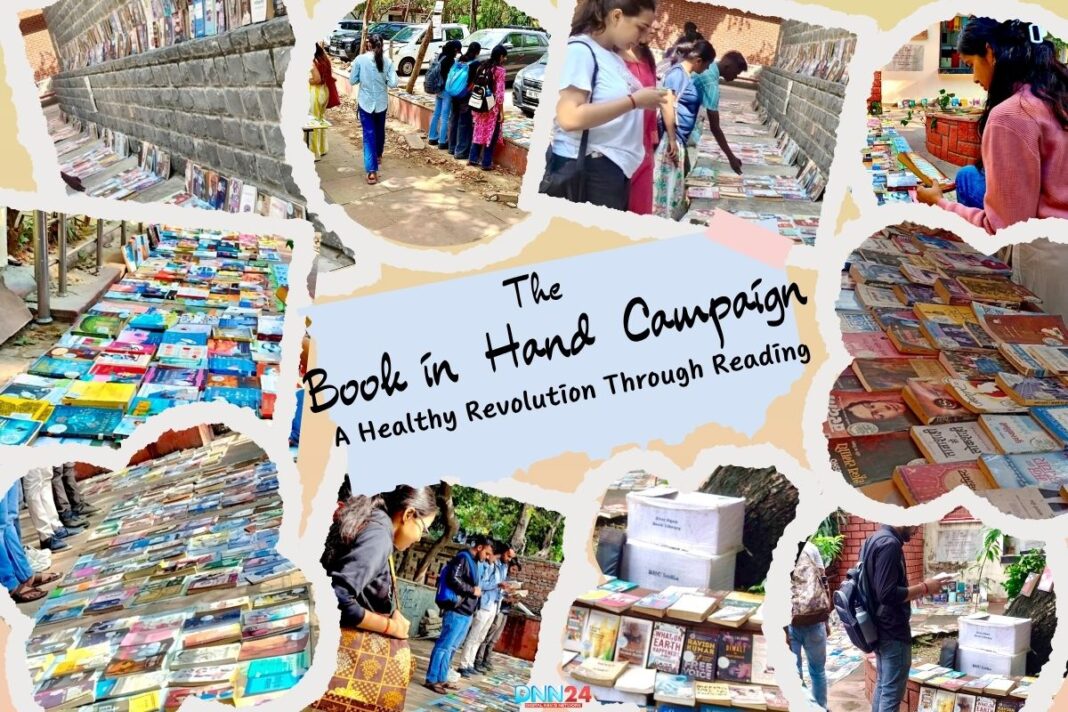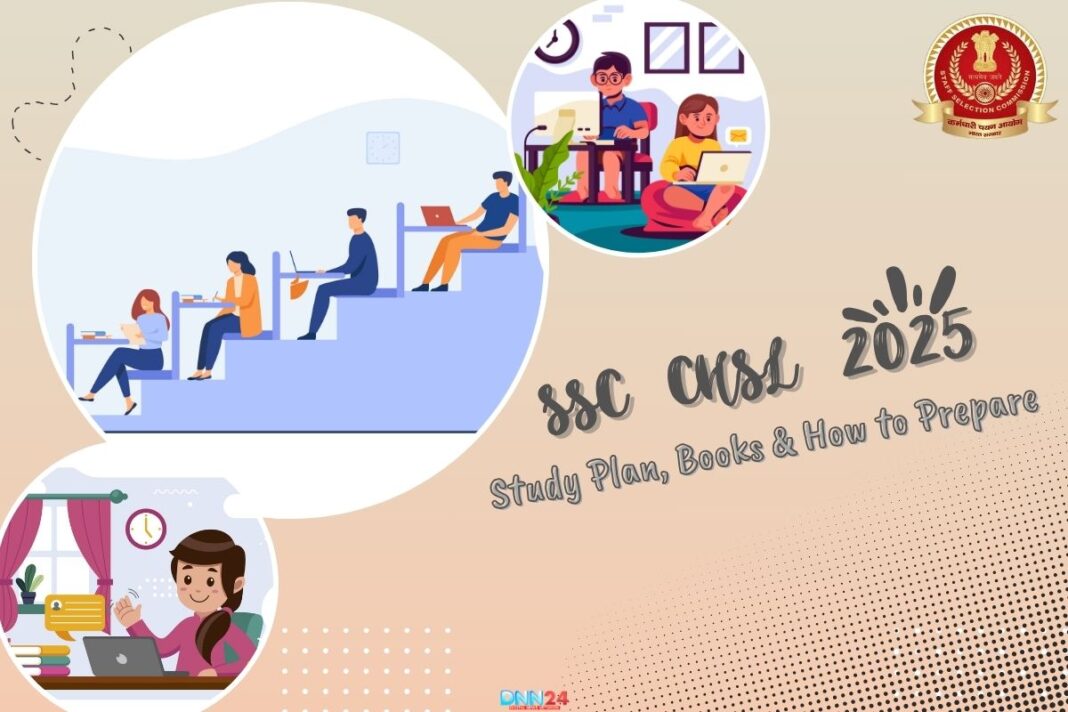In today’s fast-paced world, mental health has become a pressing concern, especially among young Indians. The Book in Hand Campaign sparks a healthy revolution, promoting wellness and growth through the transformative power of reading and knowledge every day. We are conscious about physical wellness but do not give much attention to the unimaginable importance of reading in improving mental and emotional states. The Book in Hand Campaign, an innovative initiative that started in Delhi, is not just about making books accessible but about creating a healthier society through reading.
We have the honor of directly interviewing Pratik Surya with Anurag Kumar, the genius behind this fantastic campaign, who enlightened us on the power of books to heal our minds. Pratik, a young changemaker in his mid-twenties, talked about the power of reading books to change communities and enhance public health. The campaign, which is operating under the auspices of the CELL Foundation of the founder, Anurag, is a new method of solving mental health issues in communities.
How Books Have Become the Answer to Mental Health
Pratik’s journey began with a simple observation that would later become a revolutionary idea for public health. “We had heaps of books lying around after reading them once,” he explains. “Instead of letting them gather dust, we thought – why not create a space where these books can continue healing and inspiring others?” This wasn’t just about book sharing but about recognizing reading as a therapeutic intervention.
Several studies have repeatedly demonstrated that reading can lower stress by as much as 68 percent, compared to music or tea. When Pratik, Anurag Kumar and his friends began talking about this idea in 2024, they understood that they were working on the basic needs of the health field. Creating community libraries where people could access books freely wasn’t just about literacy, mental health, stress reduction, and community well-being. The campaign’s foundation rests on the understanding that books are not luxury items but essential tools for psychological wellness, especially in underserved communities with limited mental health resources.
Delhi University: the Strategic Health Hub Choice
The decision to launch the Book in Hand Campaign at Delhi University wasn’t random—it was a calculated move with significant health implications. Universities have become hot clubs for mental issues, where students grapple with pressurizing academics characterized by students struggling with career-related issues and social anxiety. Pratik knew that the youth required an easy way to access mental help systems, and books could be that way.
“Universities are places where ideas can travel far and wide,” Pratik and Anurag observes. “We wanted to reach maximum people because mental health awareness spreads through communities.” The choice of Delhi University as the launching pad was strategic – it’s a diverse ecosystem where students from various backgrounds converge, making it an ideal testing ground for community health interventions. The college atmosphere was a virtual laboratory to assess reading programs’ effect on stress levels, academic performance, and general college well-being. Focusing on young people meant that the campaign could nurture healthy reading habits that could serve a person well for the rest of their life, so to speak, investing in the population’s long-term health.
Trust-Based Model: Groundbreaking Way of Community Health
The most innovative aspect of the Book in Hand Campaign from a health perspective is its trust-based model. This initiative is entirely deposit—and fine-free, unlike the traditional systems of libraries, which suggests that it has significant implications for community mental health and social cohesion.
“We decided from the beginning that we wouldn’t charge a single rupee,” Pratik and Anurag explains. “No deposits, no fines – just trust and goodwill.” This approach isn’t just about accessibility; it’s about dignity and mental health. Barriers to reading in the form of financial constraints can give rise to stress as well as anxiety, especially among economically disadvantaged groups whose already socioeconomically deprived psyche hardly tolerates such negative exertions. The campaign eliminates these inhibitors and thus ensures a stress-free environment that encourages reading to be seen as a pleasurable and therapeutic phenomenon, not a burden. The model of mutual trust also develops social capital that helps establish relationships in communities, which is locally critical for both mental wellness and resilience.
Challenges and Health Implications: Weather, Resources, and Community Response
Running a community health initiative through books isn’t without challenges, and these challenges reveal essential insights about public health infrastructure. Pratik frankly talks about their logistical challenges, especially weather-related limitations that pose challenges to their outdoor library structures.
“When it rains, we can’t set up our libraries, and sudden weather changes risk damaging the books,” he explains. These issues show the wider flaws in community health programming, such as the requirement of safe zones, sustainable finance, and shelter that does not require weather protection. The campaign’s financial model, currently dependent on personal contributions from team members and community donations, reflects the broader challenge of funding preventive health initiatives.
Unlike treating illness, promoting wellness through reading doesn’t generate immediate revenue, making it difficult to sustain without community support. However, Pratik reports that book return rates are impressively high at 97%, suggesting that communities value and respect these health-promoting resources when made accessible with dignity and trust.
The Ripple Effect: Intergenerational Health Benefits and Families
One of the most heartening aspects of the Book in Hand Campaign is its impact on family health dynamics. Pratik gives beautiful accounts of the parents and children visiting the libraries together, which build memories and help both generations survive in one go.
“We’ve seen mothers coming with daughters, fathers with sons – both generations taking books and reading together,” he describes with visible emotion. There are severe health implications of this intergenerational involvement. When parents model reading behavior, they’re promoting literacy and demonstrating healthy coping mechanisms and stress management techniques. Family reading improves the connection between family members; communication and establishing supportive environments are essential to mental health.
To help women develop intellectually and experience personal growth, these libraries enhance the psychological well-being of several women, especially when they cannot access formal education or career development channels. The campaign forms micro-communities based on cross-interest in reading to create social interactions, which is crucial to mental health resilience.
Advocacy of Mental Health and Youth Leadership
The Book in Hand Campaign operates with a team of 20-25 young volunteers, representing a new model of youth-led health advocacy. This strategy is fundamental as the youth are the most frequent consumers of mental health services and an emerging force in promoting the importance of peer mental health help.
Pratik emphasizes the importance of collective action: “No single person can achieve completeness in any mission. You need a strong team to accomplish anything meaningful.” This team effort teaches participants good dynamics regarding being responsible and sharing in the workplace and that asking for help is a sign of strength, not weakness.
The youth leadership approach also addresses the need to keep the project meaningful to the target group and develop leaders who will enhance their self-esteem and sense of purpose, which is a major component of positive mental health. The team’s diversity, drawn from various Delhi University colleges, creates a rich support network that benefits volunteers and library users.
Community Growth and Health Inequity
Since the campaign will extend to underserved territories beyond Delhi University, it will solve important health equity problems. Pratik’s vision extends to villages, small towns, and communities where books and mental health resources are scarce.
“Our goal is to reach places where books are most needed, where people can’t access them due to financial or geographical constraints,” he explains. Such an expansion strategy acknowledges that mental health is not only the concern of urban and educated populations but of the entire humanity.
Other communities that experience more mental health challenges include rural and poorer societies because of isolation and lack of opportunities and a developed healthcare system. By bringing books to these communities, the campaign provides accessible mental health support that doesn’t require specialized training or expensive equipment. The initiative’s focus on local leadership development ensures sustainability while building community capacity for ongoing health promotion activities.
Success Stories: Community Health and Individual Transformations
Throughout our interview, Pratik shared numerous stories of individual transformations that illustrate the campaign’s health impact. As he upholds privacy, he explains how shy people were transformed and became open to expressing themselves, how students started to relax using books during exam time, and how society acquired new interests and relationships due to their shared reading culture.
Such personal triumphs are summed up in the improved health of communities. The more individuals read and have access to reading groups, the stronger social cohesion becomes, the greater the intellectual knowledge and interest are acquired, and the more stress and adversity coping mechanisms are open to everyone. The campaign’s 97% book return rate isn’t just about logistics – it’s evidence of a community that values and supports collective well-being. This substantial rate of returns shows that when dignity and trust are brought into the provision of health resources, people who receive them become motivated to become responsible and caring communities in cycles of mutuality that become self-perpetuated.
Building the Future: Multiplier Effect of Mental Health via Reading
Pratik envisions the Book in Hand Campaign as a model for community mental health intervention that could be replicated across India and beyond. The campaign’s success demonstrates that effective health promotion doesn’t always require expensive technology or specialized facilities – sometimes, it requires understanding fundamental human needs and addressing them with creativity and compassion.
The initiative’s expansion plans include reaching more underserved communities, developing partnerships with educational institutions and healthcare organizations, and potentially integrating with formal mental health services as a complementary intervention. Pratik’s vision recognizes that sustainable health improvements require community ownership and grassroots leadership, principles that guide the campaign’s development strategy. With its expanding efforts, the idea still focuses on accessibility, dignity, and trust as prerequisites of community health programming.
Books into Building Blocks of a Healthier Community
The Book in Hand Campaign represents more than a literacy initiative – it’s a revolutionary approach to community mental health that recognizes reading as prevention and intervention. Through our conversation with Pratik Surya, we’ve seen how a simple idea about sharing books has evolved into a comprehensive health promotion strategy that addresses stress, builds social connections, strengthens families, and creates more resilient communities.
As we face increasing mental health challenges in our rapidly changing world, initiatives like the Book in Hand Campaign remind us that solutions don’t always come from hospitals or clinics. The strongest therapy may amount to something inside the covers of a book, free of charge and available with honor.
It is something remarkable that Pratik and his crew have done, and that is the development of a health intervention that is not only cheap but yields huge returns; this is testimony to the fact that when we as individuals invest in the well-being of our communities through free and easy to access resources as well as establishing trust-based relationships not only do we ensure that we will have a healthier society but also that everyone will thrive.
Also Read: Pad Squad: Spreading Menstrual Dignity Across India’s Communities
You can connect with DNN24 on Facebook, Twitter, and Instagram and subscribe to our YouTube channel.



